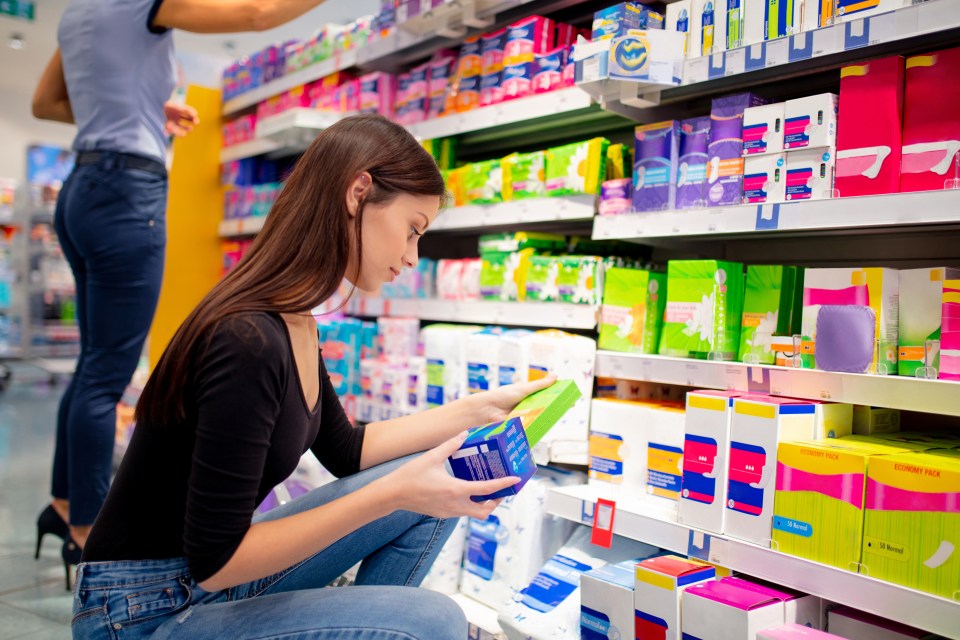TESCO has announced a first of its kind change to their shops, and it could be here to stay.
The supermarket chain revealed that 93 of its superstore locations will see the addition of a perimenopause and menopause-friendly aisle.
This roll-out is being made in a bid to “empower women with more choices”.
The new aisles will exclusively feature products relating to perimenopause and menopause.
There is expected to be a range of items, including nutrition, hair and skincare, sexual wellness, and digestive health.
The news follows Tesco’s M-tick initiative in 2024, which notified shoppers which products were considered menopause-friendly via an “M” logo on the packaging.
This menopause section was added to 200 Tesco locations across the UK for a six-week period.
Brands featured in the display included Vitabiotics vitamins, Nivea, Olay, Simple skincare products, Tena and Always products.
While no date has been confirmed for the roll-out of the specialised aisles, there has been speculation that similar items will feature.
Davina McCall’s bestselling new book, Menopausing, was also featured in last year’s roll-out.
To carry out this new initiative, Tesco has partnered with British company, GenM, which is a collective of labels, retailers, and manufacturers dedicated to empowering menopause brands.
Menopause is a natural part of ageing, which usually happens when a woman is between the ages of 45 and 55.
In the UK, the average age for a woman to go through menopause is 51.
It occurs when oestrogen levels in the body start to decline.
During this time periods become less frequent or they can suddenly stop, and after menopause occurs women will be unable to become pregnant naturally.
At the moment there are more than 48 recognised menopausal symptoms, and more than 70 per cent experience one or more of these.
Many of the symptoms can be debilitating, so easy access to products that can ease discomfort can make a huge difference to many.
What is the menopause and how does it affect women?
The menopause is a transitional period all women go through in mid-life.
Hormones related to the reproductive system deplete namely oestrogen, over a period of time.
This doesn’t just cause periods to stop. Sex hormones act all over the body, from the brain, skin, vagina and more.
Therefore, dozens of symptoms affect all areas of the body, to varying degrees.
Women’s experiences of menopause vary greatly. While some breeze through it, others’ lives are significantly impacted. It can feel as though it lasts a couple of years, or for decades.
It cannot be predicted how each woman will fare.
When is menopause?
Perimenopause is when symptoms start but periods have not yet stopped, although they will be irregular. This can start in the early 40s.
Menopause is when periods have completely stopped for a year. The average age this happens is 51, but it can be any time from 45 to 55, according to the NHS.
The term ‘menopause’ is used to describe the experience overall.
Menopause before the age of 45 is called early menopause, affecting five per cent of women. Menopause before the age of 40 is called premature menopause, affecting one per cent of women before 40 and 0.1 per cent of women under 30.
This may happen for no clear reason, but also as a result of surgery, genetics or medications.
A year after that the final period, a woman is considered to be entering the post-menopausal stage.
How does it impact a woman’s life?
The menopause can be an extremely testing time in a woman’s life and for those around her.
The body is going through a significant change, and the symptoms that come with it can feel alien, with women sometimes describing a loss of sense of self.
Physical symptoms include hot flushes (a sudden feeling of heat in the face, neck and chest), difficulty sleeping, night sweats, heart palpitations, headaches, muscle and joint aches, weight skin, skin changes, reduced libido, vaginal dryness and more.
Symptoms affecting mental health or cognition include brain fog, memory loss, low mood, anxiety, low self-esteem and irritation.
There are ways to manage symptoms and cope with menopause – and women need to know that they are not alone in facing it.
Medication, such as HRT or oestrogen gel, can help attack the symptoms.
However, experts often say it needs a rounded approach incorporating good lifestyle habits, such as a balanced diet and less alcohol.
Many women report that their life began after menopause after it drew them to a healthier way of living.
However, the huge burden it can have – on work, family life and more – is important for society to recognise, as adapting policies at work, for example, can make it easier for women to stick with their job.
Read more about menopause on The Sun’s Fabulous Menopause Matters campaign.
Perimenopause refers to the stage before a woman is officially in menopause.
During this time, hormones start to change but periods have not yet stopped for good.
According to the NHS, perimenopause is signified by irregular periods.
However, women may also experience joint pain, low libido, difficulty sleeping, weight gain, heart palpitations, sensitive teeth, mood swings, and low self esteem.
As of 2025, it is estimated that 13 million women across the UK are either perimenopausal or menopausal.
Of these, it is thought that 80% face regular symptoms, with hot flushes and night sweats most commonly reported.









